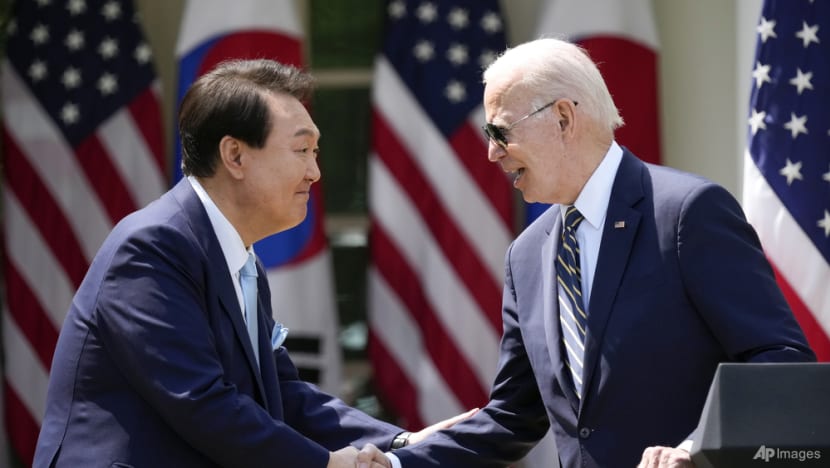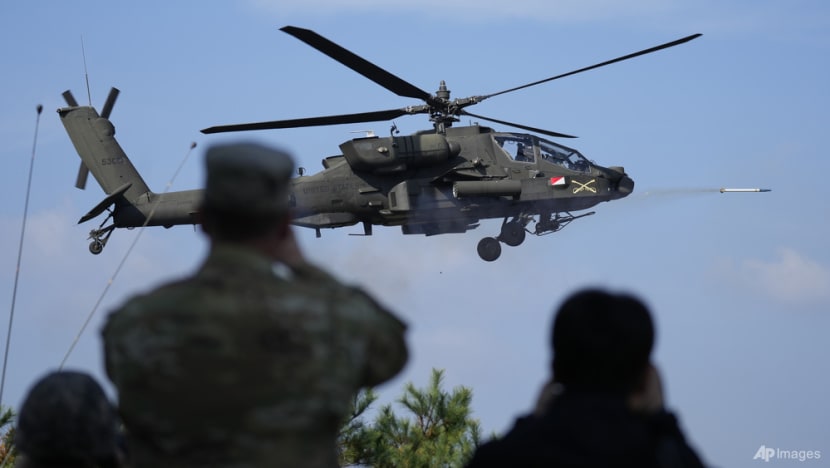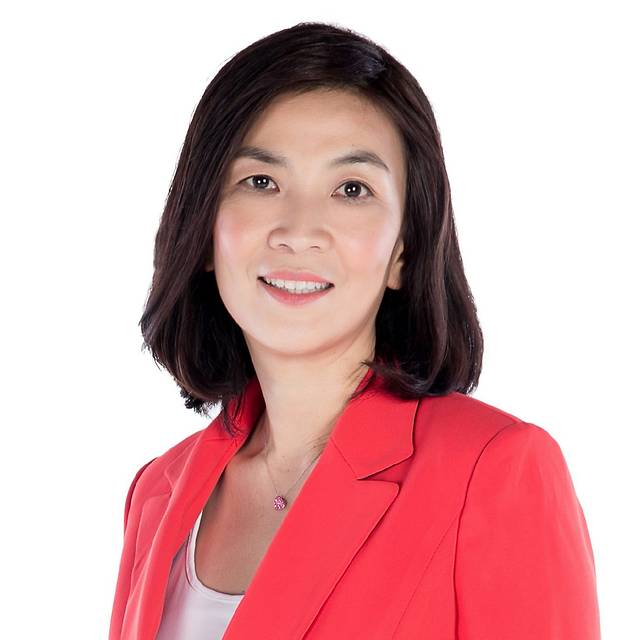South Korea closely watching US election results amid threats from Pyongyang
Analysts said it remains tough to tell if a victory by Vice President Kamala Harris or former president Donald Trump will be better for the Korean Peninsula and the region.

US President Joe Biden, right, and South Korea's President Yoon Suk Yeol shake hands during a news conference in the Rose Garden of the White House, April 26, 2023, in Washington. (File photo: AP/Andrew Harnik)

This audio is generated by an AI tool.
SEOUL: As polling day dawns on the United States on Tuesday (Nov 5), South Korea will be keeping a close eye on the results of a presidential election that could reshape the Korean Peninsula.
South Korea depends on its key ally to defend against threats from North Korea, which recently deployed troops to Russia – a move that analysts say has complicated issues for Seoul.
The two Koreas are still technically at war, having never officially signed a peace treaty when the Korean War ended in 1953.
Analysts said North Korean leader Kim Jong Un will also be closely monitoring the US election results, while it remains tough to tell if a victory by Democratic nominee Kamala Harris or her Republican rival Donald Trump will be better for the region.
NORTH KOREAN THREATS
Since 2022, Pyongyang has test-launched more than 100 missiles in response to drills that Seoul and Washington conduct regularly.
South Korea and the US established a military alliance 71 years ago.
Just last week, they held their first-ever joint live-fire exercise using drones after North Korea launched a new intercontinental ballistic missile, which is said to have flown higher than any previous tests so far.
The launch came shortly after the hermit kingdom began sending soldiers to aid Russia’s war in Ukraine, which drew swift condemnation from the US and its allies including South Korea, Japan and the European Union.

It remains to be seen how South Korean President Yoon Suk Yeol will work with the new US administration to deter threats from Pyongyang and tackle North Korea’s growing defence ties with Russia.
Seoul is worried that North Korea could gain modern warfare experience from the Ukraine war, as well as receive military technology from Russia in return.
TENSIONS IN INDO PACIFIC
Since Mr Yoon took office in 2022, Seoul has moved closer to Washington and held Beijing at arm’s length.
Experts in Seoul told CNA they believe the US-South Korea partnership will be unshaken no matter who becomes the next American president, but pressure on South Korea to fulfil certain responsibilities might change.
Cha Du-Hyeogn, principal fellow at the Asan Institute for Policy Studies, said the fundamental dilemma for South Korea will remain largely the same even if Harris wins.
“Both Democratic and Republican administrations have required South Korea to expand its role within the alliance to include regional responsibilities beyond just deterrence and defence on the Korean Peninsula,” he noted.
“The difference lies in the degree of pressure each might apply.”
Kim Hyun-wook, president of non-profit think tank Sejong Institute, said Washington will ask Seoul to turn its attention towards deterring Beijing, rather than Pyongyang.
He pointed out that threats in the Indo Pacific region are “pretty much intertwined”.
“It doesn't mean that if something happens in Taiwan, it will be something that is only confined to Taiwan. It will have an impact on the Japanese island and the Korean Peninsula, and North Korea will jump in,” Kim added.
POSSIBLE RENEGOTIATION OF DEAL UNDER TRUMP
If Trump wins the election, experts said he will likely scrap a deal reached under President Joe Biden’s administration last month, and force Seoul to pay more to host about 28,500 American troops based in South Korea.
Both countries in October agreed that Seoul will pay US$1.1 billion in 2026, when a new five-year defence cost-sharing deal kicks in. That is an increase of 8.3 per cent compared with 2025.
But Trump has said he wants to seek as much as US$10 billion from South Korea.
Asan Institute of Policy Studies’ Cha said Trump could ask for re-negotiation of the deal, and South Korea may have to promise a substantial increase in what it pays the US even if the new deal is not as extreme as Trump’s suggestion.
“South Korea could request solid assurances regarding the North Korean nuclear threat, commensurate with the increased financial contributions it is making,” Cha noted.
“In this case, given that the Trump administration tends to prioritise economic benefits, the negotiations might actually become easier in some respects.”
No matter the outcome of any negotiations, however, analysts said it is unlikely Trump will pull American troops from South Korea if he is elected – something he had previously threatened to do.
They also expressed optimism that cooperation between the US, South Korea and Japan will continue.
"Even during the first term of the Trump government, the US tried a lot to restore the relationship between Japan and Korea and make trilateral cooperation,” said Sejong Institute’s Kim.
“What I worry about is, if Trump requests a lot of budget-sharing and then puts tariffs on Japan and South Korea, I'm not sure how the South Korean and Japanese government would be willing to cooperate on the trilateral format.”

















